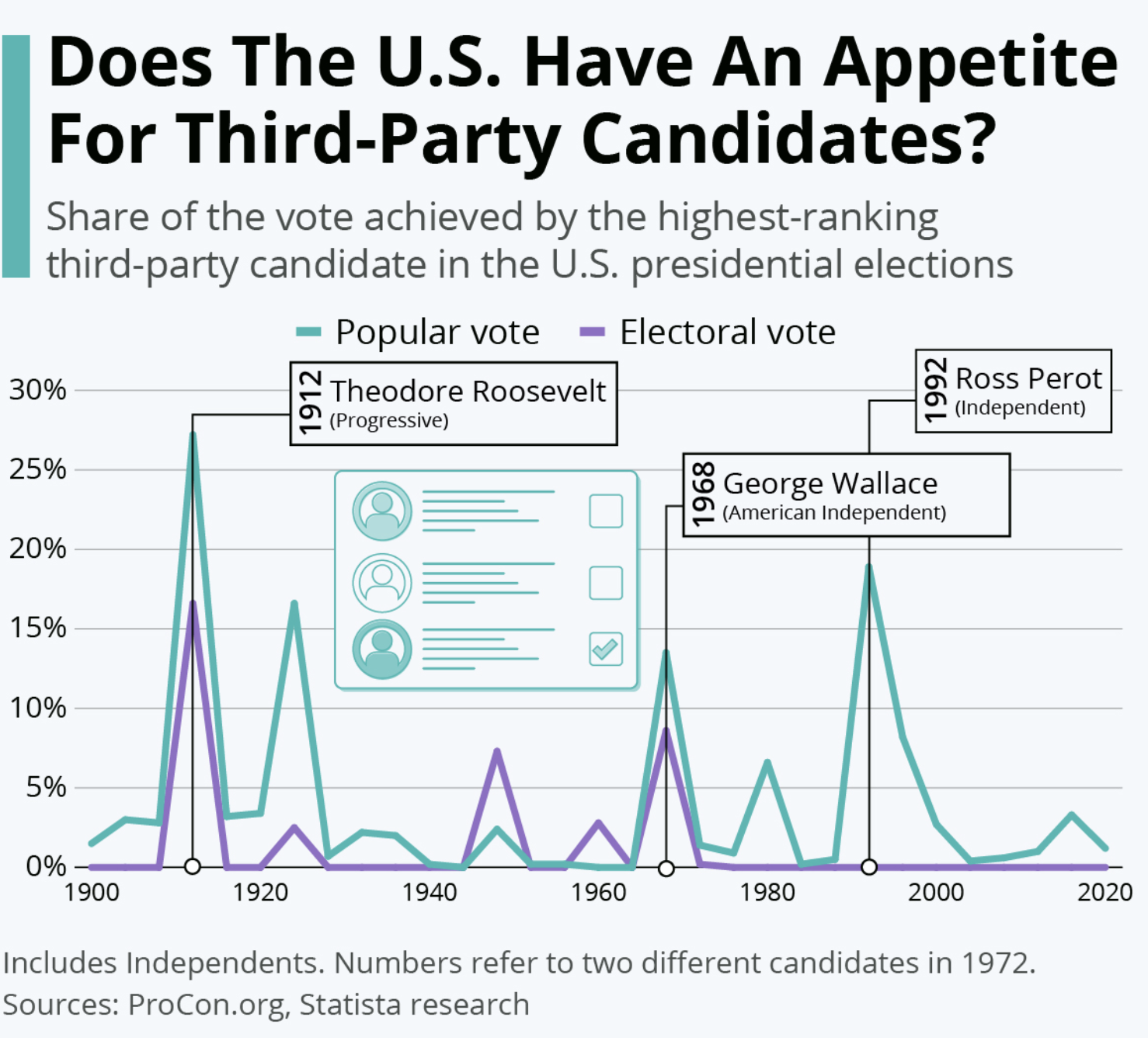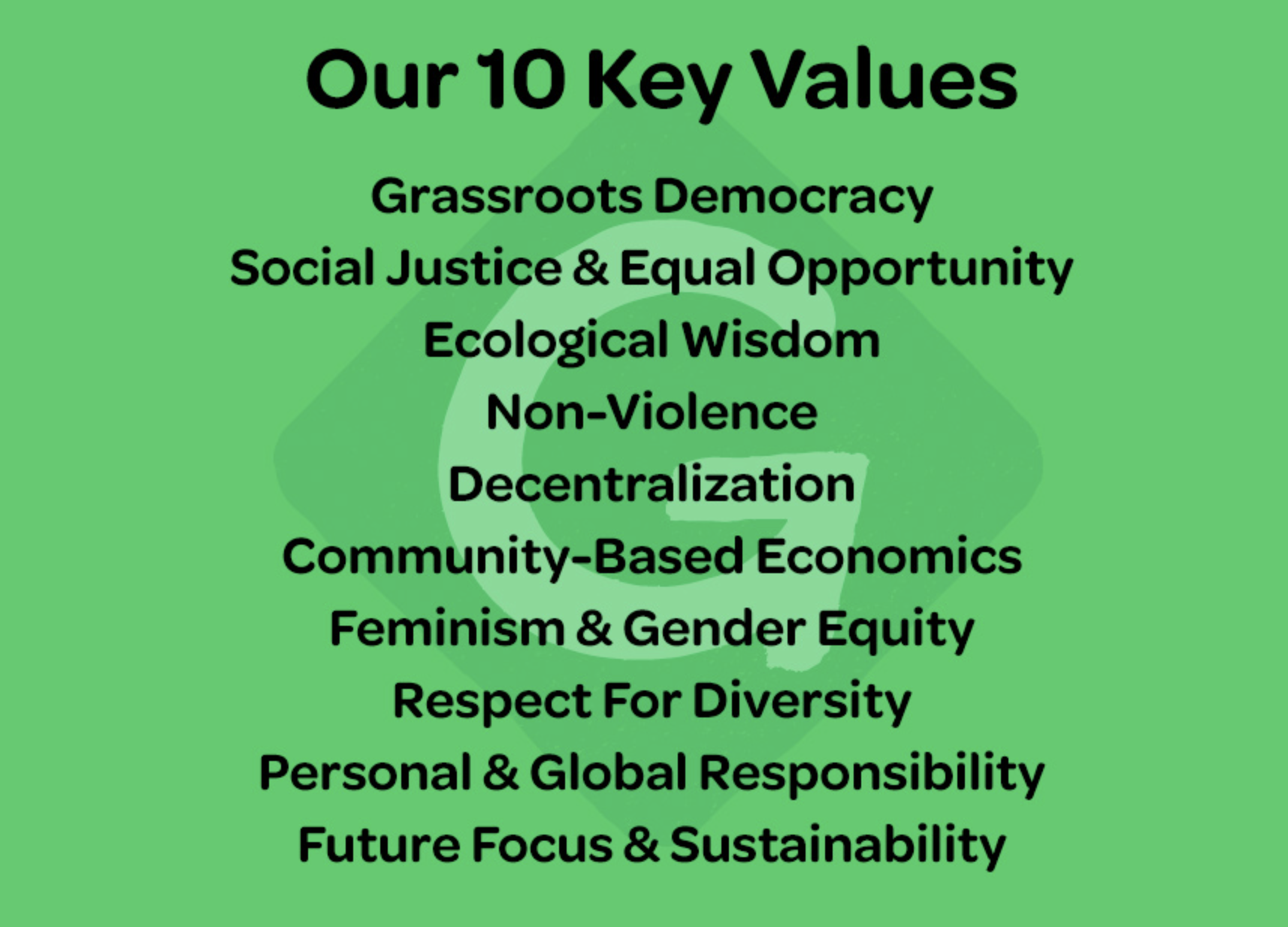
The Green Party's Beliefs
One of the biggest issues with American politics is the seeming homogeny of the two-party system. In election after election, we're faced with political parties and candidates that either offer more of the same, or worse, a regressive platform that serves few outside of special interests.
Rather than actively engaging in participatory democracy, the two major political parties seem uninterested in paying more than lip service to any new ideas. As a result, incumbents are reelected at an average rate of 93% over challengers, even when their overall approval rates are dismal. For example, Mitch McConnell's approval rating with voters in Kentucky fluctuates between 13% and 37%, yet he has been returned to the Senate by that state's voters seven times and is now the Senate's longest-serving party leader.
This is partially based on money and name recognition, among other things. But, the problem could also boil down to voters feeling that they have no other viable options.

That may no longer be true, as more third-party candidates, independents, and progressive policies are emerging and gaining broader awareness and support among the electorate. You may have social media to thank for that, but we're doing our best to ride the momentum by championing independent candidates at every level of government.
One party that has gained greater public awareness and support over the past few election cycles is the Green Party. You might not know who their 2020 presidential candidate was (it was labor leader Howie Hawkins; previous presidential candidates, consumer advocate Ralph Nader (1996, 2000) and Jill Stein (2012, 2016), have better name recognition), but you'd be hard-pressed to escape policy positions that are becoming increasingly popular with the American people.
It would be logical to think that with a name like Green Party, they're all about environmentalism and eco-friendly policies. While that's true to an extent, their policy stances and growing political impact demonstrate that the Green Party platform and political ideology are so much more than that.
The Core Beliefs of the Green Party
In the ever-evolving landscape of American politics, grassroots movements are gaining traction. Green Party beliefs act as a distinct means for advocating environmental sustainability, social justice, grassroots activism, and nonviolence.
Grounded in a firm foundation of alternative party beliefs and principles that prioritize these core values, the Green Party ideology hinges on various policies and initiatives aimed at addressing pressing issues and promoting a more equitable and ecologically responsible society based on inclusive governance.
The Green Party, officially registered as The Green Party of the United States (GPUS), was formed in 2001. It's an off-shoot and part of the natural evolution of the Association of State Green Parties (ASGP), which was formed in 1996.
Green Party beliefs are built upon 10 key values that form the basis for six principles that collectively shape its identity and policy platform.

The Green Party ideology includes concepts like:
Grassroots Democracy: Green Party beliefs emphasize the importance of involving citizens directly in decision-making processes. They seek to empower local communities and ensure that people have a say in matters that directly affect their lives.
Social Justice and Equal Opportunity: A cornerstone of the Green Party's values is the commitment to social and economic equality. The party advocates for social equality policies that address systemic inequities and work toward a society where all individuals have access to education, healthcare, housing, and basic human rights.
Ecological Wisdom and Sustainability: The Greens recognize the urgent need to address environmental challenges and support environmental conservation. They believe in sustainable development practices and engage in environmental advocacy to protect the planet's natural resources and biodiversity for current and future generations.
Nonviolence: Rejecting militarism and violence as solutions to conflicts, the Green Party promotes peaceful resolutions, both domestically and internationally.
Decentralization: The party supports decentralization of power, favoring local decision-making over centralized control. This principle aligns with their emphasis on grassroots democracy.
Community-Based Economics: The Green Party advocates for an economic system that prioritizes the well-being of communities and individuals over profit-driven motives. This involves promoting cooperatives, fair trade, and responsible consumption.
Green Party Ideology and Initiatives
The Green Party's policy proposals reflect its core values and principles that were formulated to address a wide range of social and political issues.
A few notable examples include:
Green New Deal: We've heard a lot about this over the past few years, especially with the rise of Bernie Sanders in National politics and the election of a slate of Justice Democrats to key roles in government. This legislative initiative is inspired by the urgency of climate change and includes a comprehensive plan for addressing environmental concerns while creating jobs and transitioning to renewable energy sources. This initiative seeks to reduce carbon emissions, develop strong climate change policies, invest in clean energy infrastructure, and ensure a just transition for workers in fossil fuel industries.
Universal Healthcare: Aligned with the principle of social equity and justice, the Green Party advocates for a single-payer healthcare system that provides universal access to quality healthcare services regardless of individuals' socioeconomic status.
Student Debt Relief and Tuition-Free Education: The Greens propose canceling student debt and making higher education tuition-free to reduce financial barriers to education and create a more equitable society.
Social and Racial Justice: The Green Party is committed to addressing systemic racism and promoting justice to correct systematic and historic imbalances. They support criminal justice reform, including demilitarization of law enforcement, ending the war on drugs, and addressing racial profiling.
Fair Trade and Worker Rights: The party emphasizes fair trade agreements that prioritize workers' rights, ecological sustainability, and social well-being over corporate profits. They also advocate for raising the minimum wage and supporting workers' rights to organize and collectively bargain.
Exploring Green Party Beliefs
The political ideology of Green politics is rooted in community engagement, political activism, and progressive politics. In addition to political values that prioritize environmental justice, the Green Party ideology supports a more fair and equitable society that's more diverse, inclusive, and accessible to all.
Three key beliefs of the Green Party provide insight into their perspective:
Systemic Change: The Green Party's political values reflect the belief that real change requires systemic shifts and not just incremental reforms. They advocate for transformative policies that challenge the status quo and address the root causes of societal issues.
Global Cooperation: Recognizing the interconnectedness of global challenges, Green politics emphasize international cooperation to address issues such as climate change, human rights, and poverty.
Sustainability as a Priority: Sustainability is at the forefront of Green Party beliefs. They view environmental protection for future generations as integral to any successful policy approach.
The Green Party's political ideology and policy foundation is supported by four central pillars:
Ecological Wisdom: Stewardship of the environment and recognition of humanity's dependence on healthy ecosystems.
Social Justice: The pursuit of equal rights and opportunities for all, regardless of background or identity.
Grassroots Democracy: Empowering communities and individuals to actively participate in decision-making processes.
Nonviolence: Resolving conflicts through peaceful means and rejecting war and violence as solutions.
The Green Party in the United States advocates for policies and initiatives that reflect their core principles of grassroots democracy, social justice, ecological wisdom, and nonviolence.
Why Green Party Beliefs Matter for America
In the midst of the diverse tapestry of American political ideologies, the principles, and values embraced by the Green Party hold a unique significance for the nation. While the party's ideals might not align with mainstream political narratives, they offer a thought-provoking perspective that addresses some of the most pressing challenges facing our country.
Addressing Urgent Environmental Concerns
The Green Party's emphasis on ecological wisdom is particularly relevant given the current state of the environment. With issues like climate change, pollution, and habitat destruction threatening ecosystems and human well-being, a party dedicated to prioritizing sustainable practices and safeguarding natural resources is crucial.
As America grapples with the need to transition to renewable energy sources and reduce carbon emissions, the Green Party's commitment to a Green New Deal and other environmentally focused policies provides a pathway toward a more sustainable future.
Tackling Deep-Seated Inequalities
Social justice and equal opportunity are ideals deeply ingrained in the American ethos. However, systemic inequalities persist across various aspects of society, from income disparities to racial injustices. The Green Party's dedication to addressing these disparities through policies like universal healthcare, free education, and criminal justice reform resonates with a growing sentiment that equity and fairness are essential for a prosperous and harmonious nation.
Empowering Local Communities
America's vastness and diversity are reflected not only in its landscapes but also in its communities. The Green Party's emphasis on grassroots democracy and decentralization aligns with the country's foundation of self-governance.
By advocating for decisions made at the local level and empowering citizens to actively participate in shaping their communities, the party addresses the desire for autonomy and representation that many Americans hold dear.
Promoting Peace and Diplomacy
In an era marked by geopolitical tensions and conflicts, the Green Party's commitment to nonviolence takes on renewed significance. Advocating for peaceful resolutions to conflicts and the demilitarization of law enforcement, the party reflects an aspiration for a more peaceful and just world order. This resonates with those who believe that diplomacy and cooperation should guide America's international relationships.
Sustainable Economics and Worker Empowerment
As discussions about economic systems and workers' rights continue to evolve, the Green Party's community-based economics and emphasis on fair trade align with the quest for a more equitable economy. The party's support for cooperatives, raising the minimum wage, and protecting workers' rights speaks to the broader discourse surrounding income inequality and the role of corporations in society.
Global Collaboration in a Complex World
In an era of globalization and interconnectedness, the Green Party's belief in global cooperation resonates with those who recognize that many of today's challenges transcend national borders. Issues like climate change, public health, and human rights require collaboration on a global scale, and the party's advocacy for international cooperation is a response to the interconnected nature of contemporary challenges.
While the Green Party might not be the dominant political force, its presence offers a valuable alternative voice that contributes to the broader conversation about the nation's future. Exploring the party's principles and policies can provide insights into potential solutions to complex challenges, encouraging a deeper examination of the choices America faces in shaping its path forward.
The Green Party's Impact on America
While not as mainstream as the two major political parties in the United States, the Green Party has achieved certain successes at local levels. Green Party members have been elected to various offices, including city councils, school boards, and state legislatures.
In some cases, these representatives have championed environmentally-friendly policies, tackled social issues, and developed alternative approaches to governance that align with the party's values.
There are some very notable examples of ways the Green candidates have impacted American politics and society. In addition to bringing greater awareness to important environmental issues, they've also proved to be increasingly viable candidates at all levels of government.
For example, Jill Stein may not have made much of a dent during her presidential runs, but in 2012 she garnered more votes than any other woman presidential candidate in history up to that time. Ralph Nader managed to gain three million votes during his second run, while also highlighting issues that we're still working to resolve t this day.
At the local level, Gayle McLaughlin became the first Green mayor of a city with a population over 100,000 when she beat her opponent in the 2007 Richmond. California, mayoral race. State and local Green politicians like Audrey Clement (local politician, Arlington, VA) and Rich Whitney (gubernatorial candidate, Illinois) may not have won their races, but they brought awareness to issues like affordable housing, sustainable development, single-payer health insurance, and political reform.
Overall, Green Party candidates have won 66 state and local elections, including 21 in California and 11 in Wisconsin.
On the legislative side of politics, the Green Party has successfully raised awareness and gained a great deal of support for ideological matters like ranked choice voting, recycling, eco-conscious politics, and anti-militarism.
Final Thoughts
America was founded on the spirit of independence, and the Green Party offers a viable alternative to "lesser of two evils" voting. Green Party beliefs increasingly reflect the values of Americans.
Even if you disagree with some of their policies and priorities, you can't deny that their core mission of creating a more sustainable, equitable society is worth pursuing.
If you want to learn more about the Green Party's beliefs and core mission or how you can further the cause of independent advocacy in politics, join our growing movement. We work hard to offer information, guidance, and resources that are meant to facilitate greater public participation in the political process.

